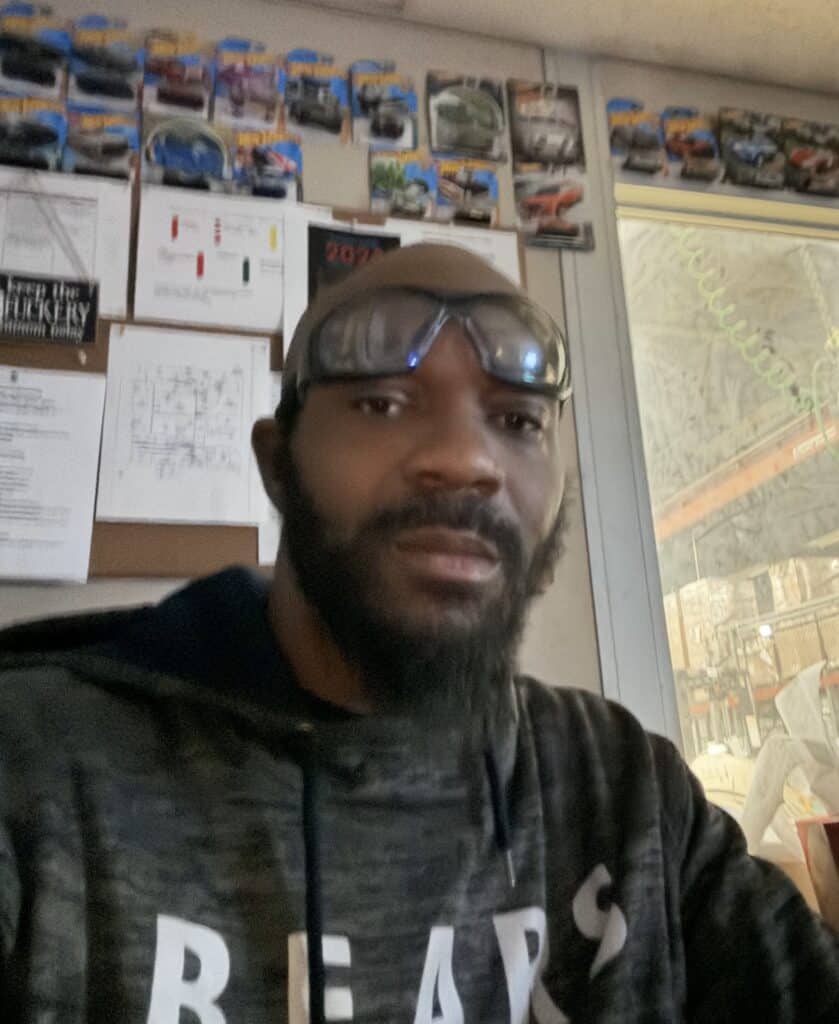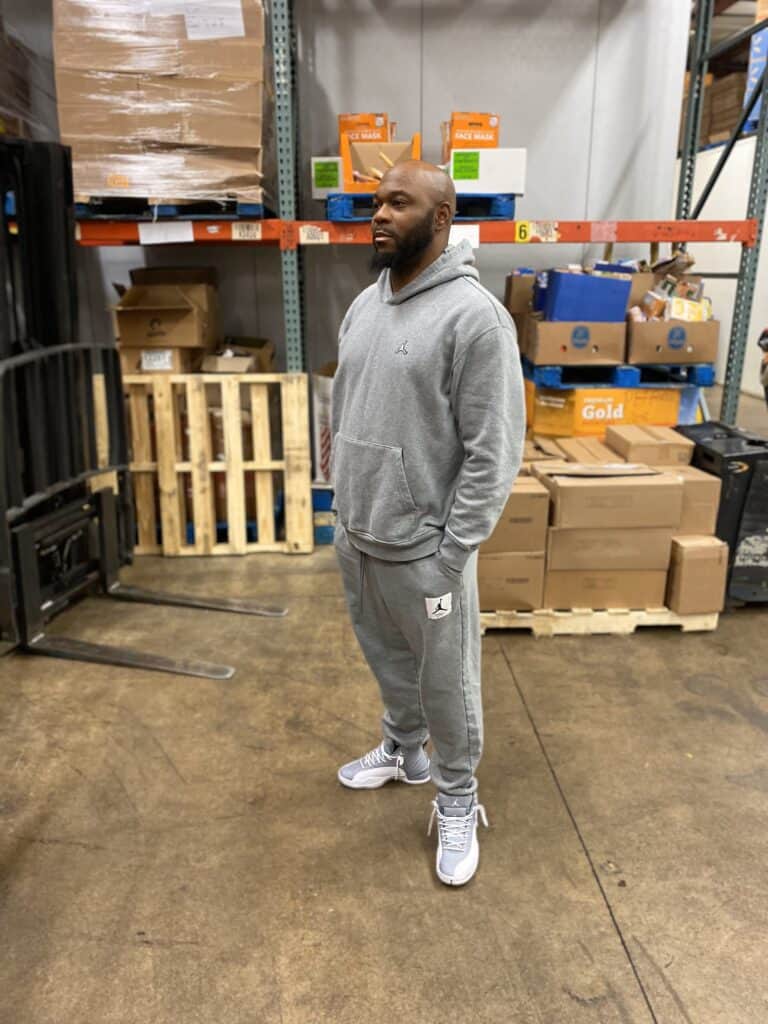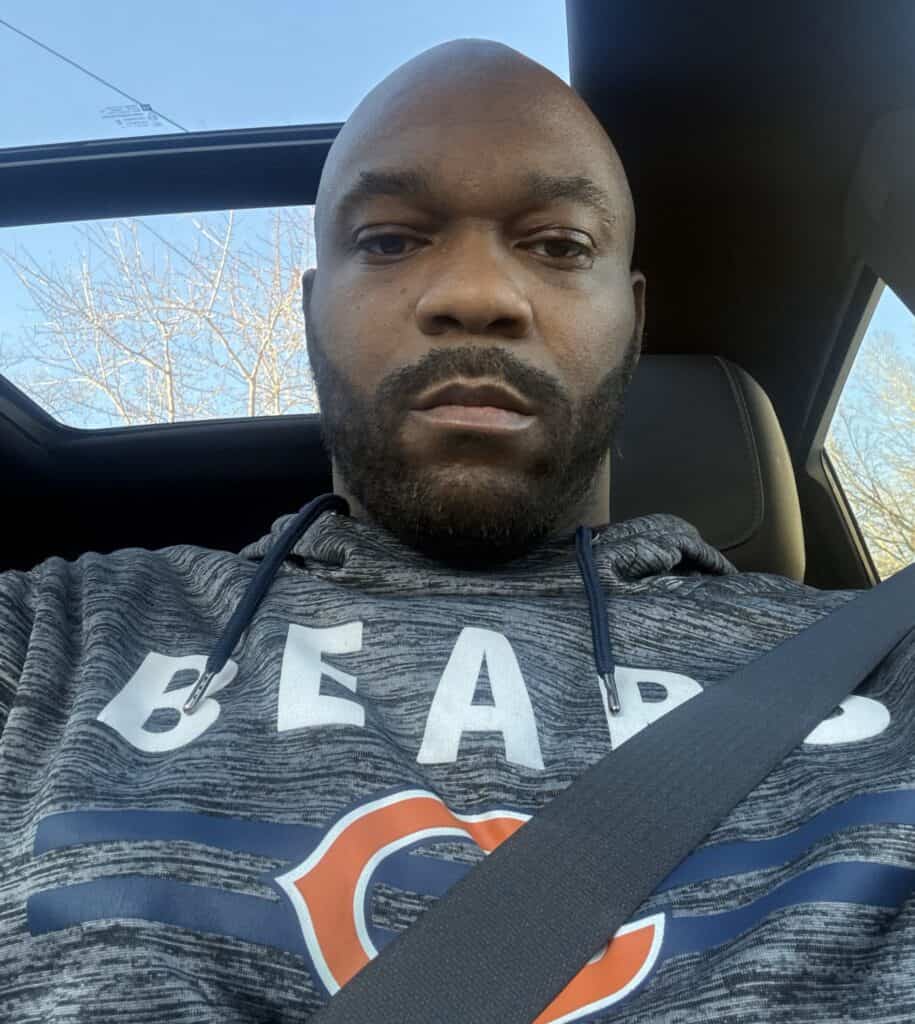Corey Johnson
Corey Johnson received two natural life sentences for an offense committed at age 16. After spending over two decades in prison, he is working hard to achieve his professional and personal goals.
“I am not my actions at 16 and I do deserve another chance to live in a free society! In the Supreme Court’s words, I’m not ‘permanently incorrigible.’ I want to be the walking embodiment of a youth’s capacity to change for the better.” – Corey Johnson
After more than two decades in prison, Corey Johnson is back home. He strongly believes that his carceral experience will not be an impediment to the realization of his dreams, which include owning a business and helping inspire younger generations. He honed this positive mindset throughout his time behind bars: “I made the decision just to wake up everyday, to strive to better myself, and to live my life as if I was getting out the next day regardless of my sentence.”
An Unstable Environment
Corey was born in East St Louis and raised on the South Side of Chicago. His childhood was not peaceful, but rather marked by years of physical and mental abuse. When given the option to move to his grandfather’s house, he decided to stay in the unstable and unsafe environment of his home in order to protect his siblings, a decision that would change the trajectory of his life forever.
In retrospect, he thinks he should not have been allowed to make such a major decision as a child. Stressed and overburdened by these tumultuous living conditions, Corey can now see his state of constant mental and emotional agitation considerably hindered his education. “The only time I could really get some peace and some sleep was during class, and that caused disruptions, and actually, problems at school,” he recalls.
To escape the chaos at home, Corey hung out with the wrong crowd, kept late hours, and got entangled in the incessant rivalries between projects and neighborhoods. He remembers how in the grim world of public housing, events quickly spiraled out of control. As a result, he became engulfed in his neighborhood’s growing wave of violence and frequently found himself at odds with the criminal legal system.
Corey had just turned 16 when he was arrested for a violent crime. Although he acknowledges he was no stranger to the system, he describes this as his “first serious offense.” He talks about his arrest as an overwhelming and traumatizing experience; not only because of the gravity of the situation and the great number of police officers involved, but also because of their demeanor during the custodial interrogation.
“When I refused to talk, they would pretty much pressure me, yell, slap tables and things of that nature trying to pretty much intimidate me,” Corey remembers. He adds that the absence of a parent or concerned adult “gave police officers the green light to do whatever they wanted, because there were no cameras to show the use of coercive tactics.”
After his arrest, Corey spent several months in a juvenile detention center. Immediately following his 17th birthday, he was taken to the St. Clair County Jail and remained there until the end of his trial. In 2001, at age 20, he was sentenced to life without parole and sent to Menard Correctional Center, the largest of Illinois’ maximum-security prisons for adult males, located approximately 300 miles from Chicago.
“Incarceration was Bad”
Corey’s incarceration was traumatizing, to say the least. “It was bad… food sucked, and medical assistance was nonexistent,” he says. The harsh conditions common in prisons and jails — including overcrowding, solitary confinement, poor food, and regular exposure to violence — significantly affected him physically and mentally. In an environment that values dehumanization and cruelty, he became increasingly hostile: “I was a jerk; I responded negatively to authority.” The lack of emotional support from his family added to his vulnerability and trauma, while increasing his defiance and inability to develop positive social interactions. “I had a negative view of the staff and didn’t associate with a lot of guys who were locked up,” he recalls.
Through adversity and loneliness, Corey says he found his true self. As he grew older, he matured and his behavior changed. He is certain that, although the absence of his family during the first 16 or 17 years of his incarceration added to his struggle, it also contributed to his growth and rehabilitation. For him, solitude was conducive to self-reflection and identity construction. He thought about what had happened in the past and what he could have done differently. Consumed with guilt and remorse, he decided to stop blaming others and to own his past. “I can’t blame my upbringing, my parents, or anybody else for the situation that I was in, or for the life that I was living at that moment,” he says.
Determined to change his life, he obtained his GED, got several job assignments, became less antagonistic, and built better relationships with staff and other incarcerated people. And even though he had no hope of being released, he decided to embrace positivity and to show that he was not irredeemable. “I made the decision just to wake up every day, to strive to better myself, and to live my life as if I was getting out the next day regardless of my sentence” he explains.
The absence of emotional support during the first half of his incarceration was not Corey’s only hurdle. He also decries the absence of legal counseling as he navigated the court system. After losing his post-conviction appeal due to his attorney’s “incompetence” and refusal to consider his opinion, he decided to advocate for himself. Despite numerous visits to the law library, he admits this was extremely stressful because he had no real legal expertise.
After several years of incarceration and being his “own attorney,” he was connected to the Bluhm Legal Clinic (Northwestern Pritzker School of Law) and Scott Main (now with the Office of the State Appellate Defender), whose commitment and efforts reminded him that he was no longer alone. Assistance and words of encouragement from both Bluhm’s legal staff and Scoot made Corey realize that “there are still some good people in the world.”
When talking about “good people,” Corey thinks fondly of two people who were pivotal to his personal growth and transformation: the clinical services supervisor at Menard, and Fred, a man he met at Menard who also originally had a juvenile life without parole sentence. They provided Corey with much needed support as he strove to change his life and improve his social interactions. Corey emphasizes that the supervisor never gave up on him. “She allowed and pushed me to do good things, to continue to help other incarcerated people,” he remembers. As for Fred, he reminded Corey that it was not just about him, but about all those who have benefited and would continue to benefit from his assistance. Corey credits both people for keeping him focused and determined to achieve his goals.
In addition, Corey considers himself particularly indebted to the clinical psychologist who assisted him during his incarceration at Menard. Requesting mental health support, he says, was a crucial step in his journey to healing. “I was at a crossroads. I felt like I was a good person, I was trying to do good, but there was something holding me back.” The clinical psychologist helped him unpack his negative feelings and emotions, and better apprehend the dynamic of his relationship with his mother. “She helped me understand that my mother’s behavior while I was growing up wasn’t reflective of the individual I am; it wasn’t reflective of the child that I was at the time,” he explains. The psychologist encouraged him to take the difficult path of complete honesty and forgiveness.
He followed her advice, and once he wrote a letter to his mother, he felt liberated. Reliving that instant, he shares: “The moment that I saw the officers take that letter out the bars it was like a weight or burden was lifted off my shoulder.” Rather than dwelling on the past and focusing on his loved ones’ absence during his first years of incarceration, he is thankful for the fact that for the past few years, he has been able to reconnect with his mother and his whole family. “When I first met my nieces and nephews that were born while I was incarcerated, they knew exactly who I was. They knew things about me, which was revealing of the fact that my sisters used to speak of me, and in a positive light, not in a negative light,” he says with a smile.
Inspire and Make a Positive Impact
Corey’s journey has been long and filled with suffering and struggles, but he never focused on the fact that he was going to die in prison; he never lost hope. His hope of release became more tangible with the 2012 U.S. Supreme Court ruling in Miller v. Alabama. In this landmark decision, the Court declared that mandatory life without parole sentences were unconstitutional for those who were 17 and under at the time of their offense. Corey, who was still in Menard when he heard about this ruling, remembers his relief, enthusiasm, and joy at the prospect of being out one day.
Taking ownership of his past mistakes was a crucial step in Corey’s journey of transformation. He learned to hold himself accountable and endeavor to become a better person. Drawing from the biblical story of Joseph, who was sold by his brothers, he considers his time in prison as a necessary step to complete a particular purpose.
At the time of this interview, Corey was out on work release, a conditional release that allows people to leave prison and work at a job. One of his primary goals was to make sure he would be fully ready for reentry. “Throughout my whole incarceration I felt like a burden, whether it was a burden on the taxpayers, my family, or anybody, even myself. I felt like a burden, and I never want to be a burden again. So that’s the reason why I work hard every day, you know, I plan, I budget, I strive to ensure that I’m putting myself in a position to not be a burden,” he says.
After 24 years of incarceration, Corey is now on Mandatory Supervised Release (MSR), with specific projects in mind, in particular owning a business. He is fully aware of the difficulties of reentry and reacclimating to a society that has evolved without him, but he is convinced that he is mentally ready for the challenge. He thinks he owes it not only to himself but also to society to succeed. “I’m not my actions at 16, and I do deserve another chance to live in a free society! In the Supreme Court’s words, I’m not ‘permanently incorrigible.’ I want to be the walking embodiment of a youth’s capacity to change for the better,” he declares.
Corey would also like to inspire other young people in and beyond his community. Having made an impact by sharing his story as part of the St. Clair County Jail Teen Court / Second Chance program from 2015 to 2021, he knows how powerful the voices of currently and formerly incarcerated people are. He is cognizant of his limits, but he is determined to use his experience to contribute to the reduction of youth violence. “I know that I can’t change or help everybody but if I can help only one teenager understand that at the end of the day it’s not worth it, then I did something because that means I will have prevented some harm from being done,” he explains.
Corey firmly believes that stories from people like him who served long sentences, as well as access to community centers, attention from concerned adults (including teachers and mentors), and appropriate physical and mental youth development programs can lead to better social and educational outcomes for younger generations.
More from the “More than a Conviction” Project
Up Next
Read the story of another returning citizen who was sentenced to juvenile life without parole and is now free
Read moreOther Stories
Discover the impacts of juvenile life without parole sentences in Illinois from additional perspectives
Learn moreReport
Read the Restore Justice report on juvenile life without parole and extreme sentencing in Illinois
Read the report



